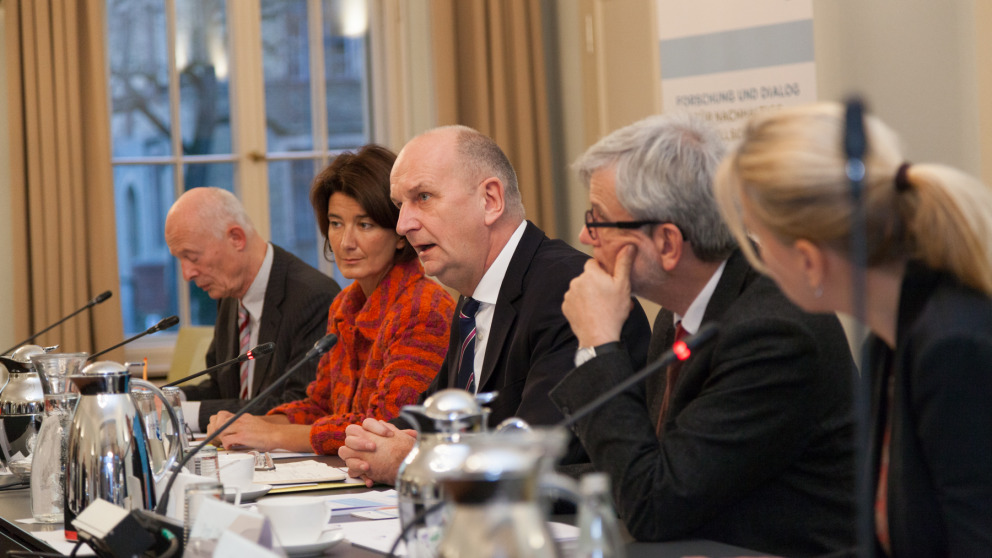A Future Commission for Brandenburg
15.12.2017
The Governor of Brandenburg and members of the state government came to the IASS on 12 December to discuss energy policy and climate protection. Together with the directors of the IASS and the Potsdam Institute for Climate Impact Research (PIK), they explored the idea of a Future Commission to ensure that Brandenburg’s energy transition is socially responsible and economically sustainable.

It was an illustrious group of people that met at the Institute for Advanced Sustainability Studies (IASS) in mid-December: the Governor of Brandenburg Dietmar Woidke, several ministers from his cabinet, and the Director of the Potsdam Institute for Climate Impact Research (PIK) Hans Joachim Schellnhuber gathered in the Kleist Villa to discuss the future of energy policy, climate protection, and sustainability in Brandenburg with IASS Directors Ortwin Renn, Patrizia Nanz, Mark Lawrence, and Jakob Meyer.
The two-hour meeting was characterised by “very constructive and very open debate on the issues that are exercising all of us,” said climate researcher Hans Joachim Schellnhuber. Whether in relation to the coal phaseout, heavy industry, the mobility transition, agriculture, or a more climate friendly building sector, now is the time to develop positive visions of Brandenburg’s future and embed them in the context of the global dynamics of modernisation processes such as digitalisation, Schellnhuber said.
Governor Woidke pointed out that a number of issues are crying out for scientific support. “How can we in Brandenburg make an even greater contribution to climate protection while continuing to promote social and economic development in the state so as not to leave people out?” For Woidke, this is a huge challenge, exemplified by the job losses in the lignite-mining industry. The Governor welcomed the fact that research institutes like the IASS and PIK are focusing on such transformation processes.
IASS Director Ortwin Renn explained that these processes can only be successful and socially responsible if they are approached systemically: What’s needed is a kind of thinking that bridges the conflicting perspectives of the business community, civil society, policymakers, and the local population. “It’s very important that transformation processes include all the people who are affected by them.” Renn underlined that the wider public should not be viewed simply as people that have to be “won over”, because they are in fact active contributors to change.
Governor Woidke expressed his confidence that Brandenburg will achieve its carbon reduction targets by 2020. That means that the state will gradually wind down its lignite-mining industry in the coming decades. But that needs to happen “without social or economic chaos,” Woidke cautioned. The political transformation of the 1990s has shown that transformation processes don’t just need a lot of money, but also patience, ideas, and time. And scientific support for this transformation has to be “hands on”. “The Future Commission is a good idea if the region feels that its needs are being taken on board,” stressed Woidke.
Hans Joachim Schellnhuber reminded the participants of the discussion that the decade from 2020 to 2030 is globally decisive for climate protection. The PIK Director believes that the required transformation is a huge economic opportunity. “Massive and sometimes disruptive innovations are set to happen in all economic sectors by 2030,” explained Schellnhuber. Enormous accomplishments can be expected, for example in the field of storage technologies for electricity and heat. “Why shouldn’t Brandenburg try to be a front runner in these developments?”




